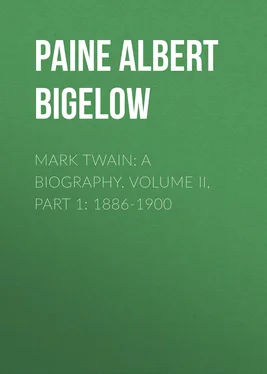Albert Paine - Mark Twain - A Biography. Volume II, Part 1 - 1886-1900
Здесь есть возможность читать онлайн «Albert Paine - Mark Twain - A Biography. Volume II, Part 1 - 1886-1900» — ознакомительный отрывок электронной книги совершенно бесплатно, а после прочтения отрывка купить полную версию. В некоторых случаях можно слушать аудио, скачать через торрент в формате fb2 и присутствует краткое содержание. Жанр: Биографии и Мемуары, foreign_antique, на английском языке. Описание произведения, (предисловие) а так же отзывы посетителей доступны на портале библиотеки ЛибКат.
- Название:Mark Twain: A Biography. Volume II, Part 1: 1886-1900
- Автор:
- Жанр:
- Год:неизвестен
- ISBN:нет данных
- Рейтинг книги:5 / 5. Голосов: 1
-
Избранное:Добавить в избранное
- Отзывы:
-
Ваша оценка:
- 100
- 1
- 2
- 3
- 4
- 5
Mark Twain: A Biography. Volume II, Part 1: 1886-1900: краткое содержание, описание и аннотация
Предлагаем к чтению аннотацию, описание, краткое содержание или предисловие (зависит от того, что написал сам автор книги «Mark Twain: A Biography. Volume II, Part 1: 1886-1900»). Если вы не нашли необходимую информацию о книге — напишите в комментариях, мы постараемся отыскать её.
Mark Twain: A Biography. Volume II, Part 1: 1886-1900 — читать онлайн ознакомительный отрывок
Ниже представлен текст книги, разбитый по страницам. Система сохранения места последней прочитанной страницы, позволяет с удобством читать онлайн бесплатно книгу «Mark Twain: A Biography. Volume II, Part 1: 1886-1900», без необходимости каждый раз заново искать на чём Вы остановились. Поставьте закладку, и сможете в любой момент перейти на страницу, на которой закончили чтение.
Интервал:
Закладка:
For instance, [here follows a plan and a possible list of the cities to be visited]. The letter continues:
Call the gross receipts $100,00 for four months and a half, and the profit from $60,000 to $75,000 (I try to make the figures large enough, and leave it to the public to reduce them).
I did not put in Philadelphia because Pugh owns that town, and last winter, when I made a little reading-trip, he only paid me $300, and pretended his concert (I read fifteen minutes in the midst of a concert) cost him a vast sum, and so he couldn't afford any more. I could get up a better concert with a barrel of cats.
I have imagined two or three pictures and concocted the accompanying remarks, to see how the thing would go. I was charmed.
Well, you think it over, Nast, and drop me a line. We should have some fun.
Undoubtedly this would have been a profitable combination, but Nast had a distaste for platforming—had given it up, as he thought, for life. So Clemens settled down to the fireside days, that afforded him always the larger comfort. The children were at an age "to be entertaining, and to be entertained." In either case they furnished him plenty of diversion when he did not care to write. They had learned his gift as a romancer, and with this audience he might be as extravagant as he liked. They sometimes assisted by furnishing subjects. They would bring him a picture, requiring him to invent a story for it without a moment's delay. Sometimes they suggested the names of certain animals or objects, and demanded that these be made into a fairy tale. If they heard the name of any new creature or occupation they were likely to offer them as impromptu inspiration. Once he was suddenly required to make a story out of a plumber and a "bawgunstrictor," but he was equal to it. On one side of the library, along the book-shelves that joined the mantelpiece, were numerous ornaments and pictures. At one end was the head of a girl, that they called "Emeline," and at the other was an oil-painting of a cat. When other subjects failed, the romancer was obliged to build a story impromptu, and without preparation, beginning with the cat, working along through the bric-a-brac, and ending with "Emeline." This was the unvarying program. He was not allowed to begin with "Emeline" and end with the cat, and he was not permitted to introduce an ornament from any other portion of the room. He could vary the story as much as he liked. In fact, he was required to do that. The trend of its chapters, from the cat to "Emeline," was a well-trodden and ever-entertaining way.
He gave up his luxurious study to the children as a sort of nursery and playroom, and took up his writing-quarters, first in a room over the stables, then in the billiard-room, which, on the whole, he preferred to any other place, for it was a third-story remoteness, and he could knock the balls about for inspiration.
The billiard-room became his headquarters. He received his callers there and impressed them into the game. If they could play, well and good; if they could not play, so much the better—he could beat them extravagantly, and he took a huge delight in such conquests. Every Friday evening, or oftener, a small party of billiard-lovers gathered, and played until a late hour, told stories, and smoked till the room was blue, comforting themselves with hot Scotch and general good-fellowship. Mark Twain always had a genuine passion for billiards. He was never tired of the game. He could play all night. He would stay till the last man gave out from sheer weariness; then he would go on knocking the balls about alone. He liked to invent new games and new rules for old games, often inventing a rule on the spur of the moment to fit some particular shot or position on the table. It amused him highly to do this, to make the rule advantage his own play, and to pretend a deep indignation when his opponents disqualified his rulings and rode him down. S. C. Dunham was among those who belonged to the "Friday Evening Club," as they called it, and Henry C. Robinson, long dead, and rare Ned Bunce, and F. G. Whitmore; and the old room there at the top of the house, with its little outside balcony, rang with their voices and their laughter in that day when life and the world for them was young. Clemens quoted to them sometimes:
Come, fill the cup, and in the fire of spring
Your winter garment of repentance fling;
The bird of time has but a little way
To flutter, and the bird is on the wing.
Omar was new then on this side of the Atlantic, and to his serene "eat, drink, and be merry" philosophy, in Fitzgerald's rhyme, these were early converts. Mark Twain had an impressive, musical delivery of verse; the players were willing at any moment to listen as he recited:
For some we loved, the loveliest and best
That from his vintage rolling time has prest,
Have drunk their cup a round or two before,
And one by one crept silently to rest.
Ah, make the most of what we yet may spend,
Before we too into the dust descend;
Dust unto dust, and under dust to lie,
Sans wine, sans song, sans singer, and—sans End.'
—[The 'Rubaiyat' had made its first appearance, in Hartford, a little before in a column of extracts published in the Courant.] Twichell immediately wrote Clemens a card:
"Read (if you haven't) the extracts from Oman Khayyam, on the first page of this morning's Courant. I think we'll have to get the book. I never yet came across anything that uttered certain thoughts of mine so. adequately. And it's only a translation. Read it, and we'll talk it over. There is something in it very like the passage of Emerson you read me last night, in fact identical with it in thought.
"Surely this Omar was a great poet. Anyhow, he has given me an immense revelation this morning.
"Hoping that you are better,
J. H. T."Twichell's "only a translation" has acquired a certain humor with time.
CXVI
OFF FOR GERMANY
The German language became one of the interests of the Clemens home during the early months of 1878. The Clemenses had long looked forward to a sojourn in Europe, and the demand for another Mark Twain book of travel furnished an added reason for their going. They planned for the spring sailing, and to spend a year or more on the Continent, making their headquarters in Germany. So they entered into the study of the language with an enthusiasm and perseverance that insured progress. There was a German nurse for the children, and the whole atmosphere of the household presently became lingually Teutonic. It amused Mark Twain, as everything amused him, but he was a good student; he acquired a working knowledge of the language in an extraordinarily brief time, just as in an earlier day he had picked up piloting. He would never become a German scholar, but his vocabulary and use of picturesque phrases, particularly those that combined English and German words, were often really startling, not only for their humor, but for their expressiveness.
Necessarily the new study would infect his literature. He conceived a plan for making Captain Wakeman (Stormfield) come across a copy of Ollendorf in Heaven, and proceed to learn the language of a near-lying district.
They arranged to sail early in April, and, as on their former trip, persuaded Miss Clara Spaulding, of Elmira, to accompany them. They wrote to the Howellses, breaking the news of the journey, urging them to come to Hartford for a good-by visit. Howells and his wife came. The Twichells, Warners, and other Hartford friends paid repeated farewell calls. The furniture was packed, the rooms desolated, the beautiful home made ready for closing.
They were to have pleasant company on the ship. Bayard Taylor, then recently appointed Minister to Germany, wrote that he had planned to sail on the same vessel; Murat Halstead's wife and daughter were listed among the passengers. Clemens made a brief speech at Taylor's "farewell dinner."
Читать дальшеИнтервал:
Закладка:
Похожие книги на «Mark Twain: A Biography. Volume II, Part 1: 1886-1900»
Представляем Вашему вниманию похожие книги на «Mark Twain: A Biography. Volume II, Part 1: 1886-1900» списком для выбора. Мы отобрали схожую по названию и смыслу литературу в надежде предоставить читателям больше вариантов отыскать новые, интересные, ещё непрочитанные произведения.
Обсуждение, отзывы о книге «Mark Twain: A Biography. Volume II, Part 1: 1886-1900» и просто собственные мнения читателей. Оставьте ваши комментарии, напишите, что Вы думаете о произведении, его смысле или главных героях. Укажите что конкретно понравилось, а что нет, и почему Вы так считаете.












